How to remove DebugCompile from your computer
![]() Written by Tomas Meskauskas on (updated)
Written by Tomas Meskauskas on (updated)
What kind of app is DebugCompile?
Our analysis of the DebugCompile application has uncovered its primary objective, which is to disseminate intrusive advertisements. Thus, we have classified DebugCompline as adware. Beyond merely presenting ads, DebugCompile may also gather diverse information. Another factor eroding trust in DebugCompile is its distribution through deceptive means.
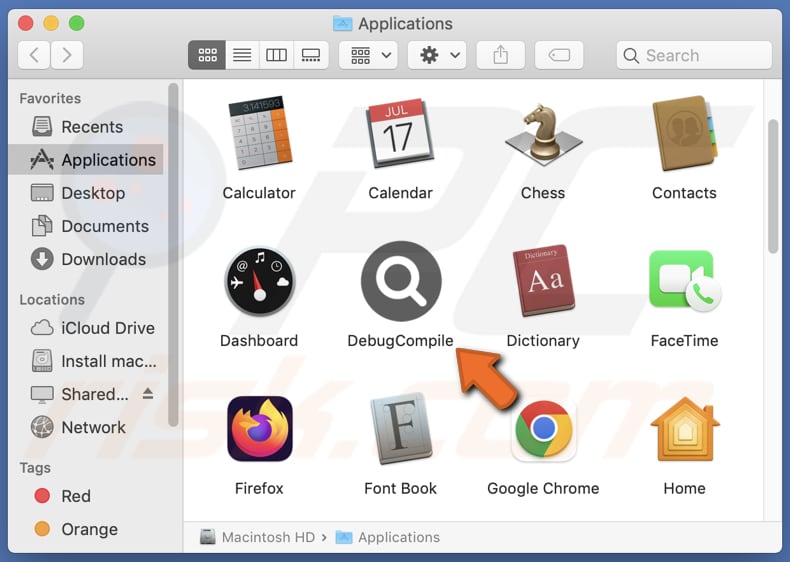
DebugCompile adware in detail
DebugCompile exhibits characteristics typical of adware. The program appears to be designed with the specific intent of delivering intrusive advertisements to users. This can manifest as an unwelcome inundation of pop-ups or banners during online activities, disrupting the user's workflow and potentially leading to a negative browsing experience.
Adware like DebugCompile often employs aggressive tactics to grab the user's attention, making it challenging to ignore or close the displayed ads. Moreover, applications like DebugCompile frequently engage in the unauthorized collection of user information. This can range from browsing habits and search history to more sensitive data like login credentials or personal details.
Such practices raise serious privacy concerns, as users may unwittingly become targets for targeted advertising or, in more severe cases, fall victim to identity theft or other cybercrimes. Sometimes, advertising-supported apps can function as browser hijackers. In these cases, they change the settings of web browsers to promote questionable websites or search engines.
Overall, understanding the characteristics and potential risks associated with adware is crucial for users to safeguard their digital environments and personal information from intrusive and deceptive applications like DebugCompile.
| Name | Ads by DebugCompile |
| Threat Type | Adware, Mac malware, Mac virus |
| Detection Names | Avast (MacOS:Adload-CC [Adw]), Combo Cleaner (Gen:Variant.Adware.MAC.Adload.32), ESET-NOD32 (A Variant Of OSX/Adware.Synataeb.F), Kaspersky (Not-a-virus:HEUR:AdWare.OSX.Adload.h), Full List (VirusTotal) |
| Additional Information | This application belongs to Adload malware family. |
| Symptoms | Your Mac becomes slower than normal, you see unwanted pop-up ads, you are redirected to dubious websites. |
| Distribution methods | Deceptive pop-up ads, free software installers (bundling), torrent file downloads. |
| Damage | Internet browser tracking (potential privacy issues), display of unwanted ads, redirects to dubious websites, loss of private information. |
| Malware Removal (Mac) | To eliminate possible malware infections, scan your Mac with legitimate antivirus software. Our security researchers recommend using Combo Cleaner. |
Conclusion
In conclusion, DebugCompile emerges as a concerning instance of adware, embodying the undesirable traits commonly associated with such software. Our examination reveals that DebugCompile is not merely an innocent application but rather a tool specifically crafted to inundate users with intrusive advertisements.
Vigilance and the implementation of robust cybersecurity measures become imperative to shield against potential privacy breaches and the disruptive impact of unwanted advertisements. More examples of apps similar to DebugCompile are LaunchImprovment, VideoEthernetInteger, and SyncedAdmin.
How did DebugCompile install on my computer?
Adware creators frequently bundle their software with free applications, enticing users to install additional, unwanted programs during the installation process. Users who hastily click through installation prompts without thoroughly reviewing them may unintentionally grant permission for adware like DebugCompile to infiltrate their systems.
Additionally, clicking on deceptive advertisements or engaging with misleading links can lead to adware installations. In other cases, users unknowingly install adware when interacting with unreliable downloads from P2P networks, third-party downloaders, free file hosting sites, and similar sources.
How to avoid installation of unwanted applications?
Firstly, it is crucial to download software only from reputable and official sources. Trusted platforms, such as official app stores or the official websites of software developers, are less likely to host applications bundled with adware. Users should also exercise caution when clicking on advertisements, especially those that seem suspicious or promise unrealistic offers.
Additionally, during the installation process, users should carefully read each prompt and uncheck any boxes indicating additional, non-essential software installation. Taking the time to review and customize installation settings can help users prevent the inadvertent installation of adware.
If your computer is already infected with DebugCompile, we recommend running a scan with Combo Cleaner Antivirus for macOS to automatically eliminate this adware.
A pop-up that appears after the installation of DebugCompile:
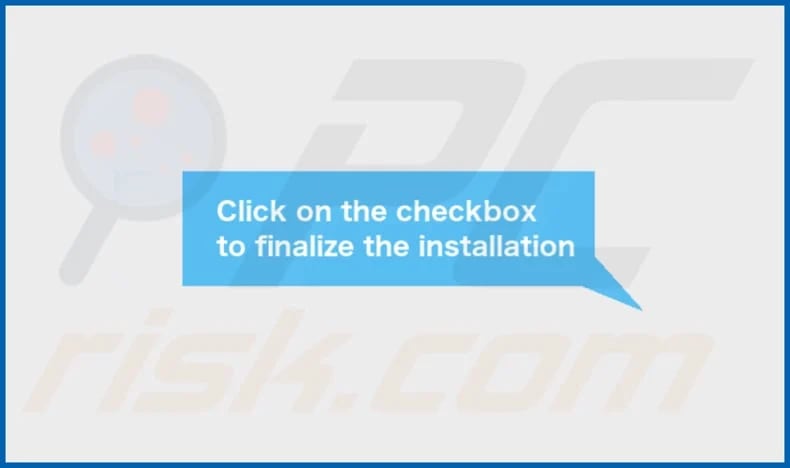
DebugCompile's installation folder:
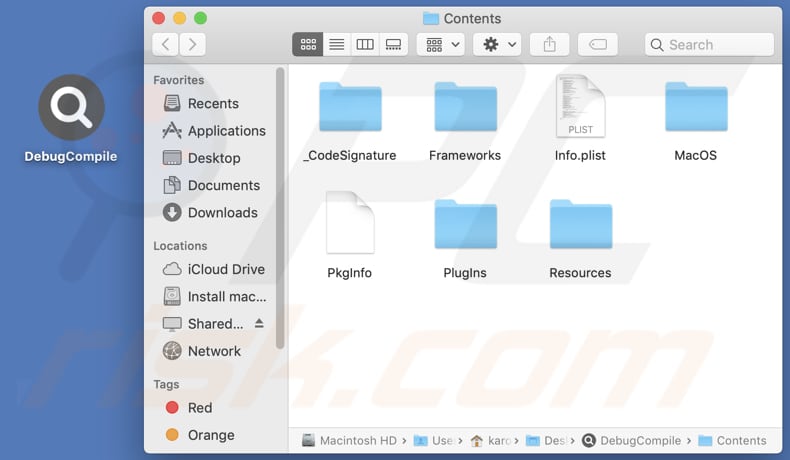
Instant automatic Mac malware removal:
Manual threat removal might be a lengthy and complicated process that requires advanced IT skills. Combo Cleaner is a professional automatic malware removal tool that is recommended to get rid of Mac malware. Download it by clicking the button below:
▼ DOWNLOAD Combo Cleaner for Mac
By downloading any software listed on this website you agree to our Privacy Policy and Terms of Use. To use full-featured product, you have to purchase a license for Combo Cleaner. Limited seven days free trial available. Combo Cleaner is owned and operated by Rcs Lt, the parent company of PCRisk.com read more.
Quick menu:
- What is DebugCompile?
- STEP 1. Remove DebugCompile related files and folders from OSX.
- STEP 2. Remove DebugCompile ads from Safari.
- STEP 3. Remove DebugCompile adware from Google Chrome.
- STEP 4. Remove DebugCompile ads from Mozilla Firefox.
Video showing how to remove DebugCompile adware using Combo Cleaner:
DebugCompile adware removal:
Remove DebugCompile-related potentially unwanted applications from your "Applications" folder:
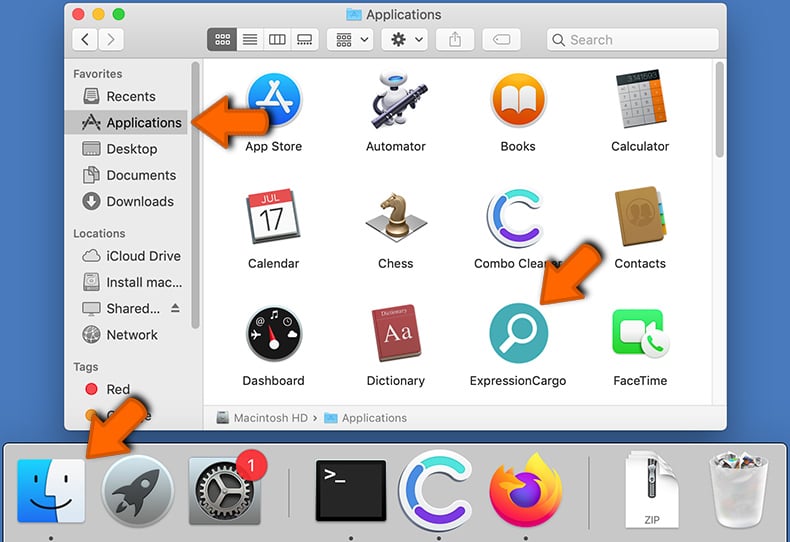
Click the Finder icon. In the Finder window, select "Applications". In the applications folder, look for "MPlayerX", "NicePlayer", or other suspicious applications and drag them to the Trash. After removing the potentially unwanted application(s) that cause online ads, scan your Mac for any remaining unwanted components.
Remove adware-related files and folders
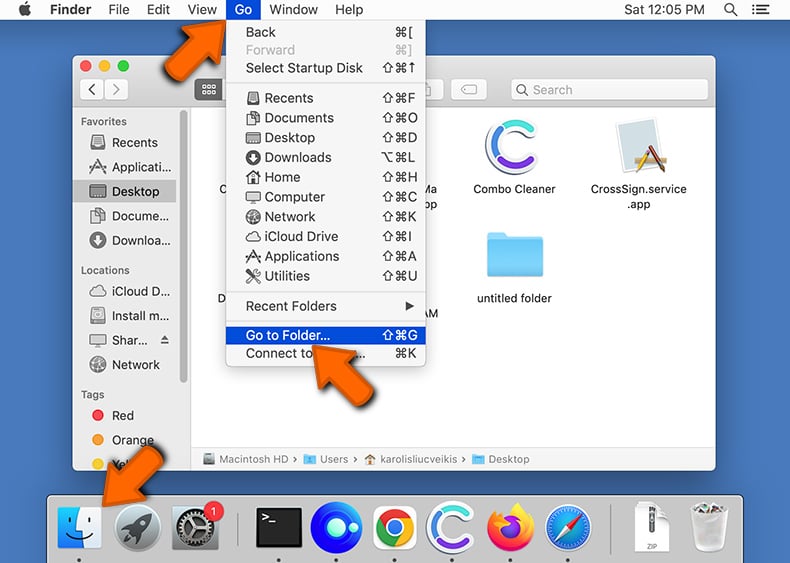
Click the Finder icon, from the menu bar. Choose Go, and click Go to Folder...
 Check for adware generated files in the /Library/LaunchAgents/ folder:
Check for adware generated files in the /Library/LaunchAgents/ folder:
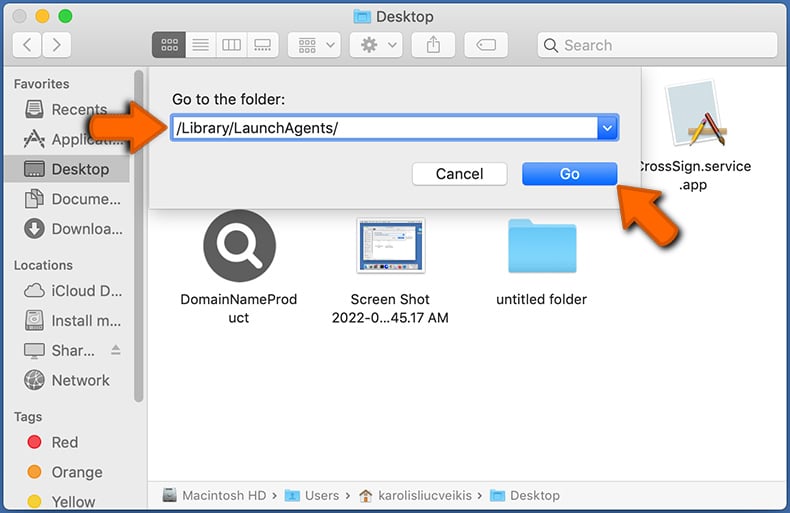
In the Go to Folder... bar, type: /Library/LaunchAgents/
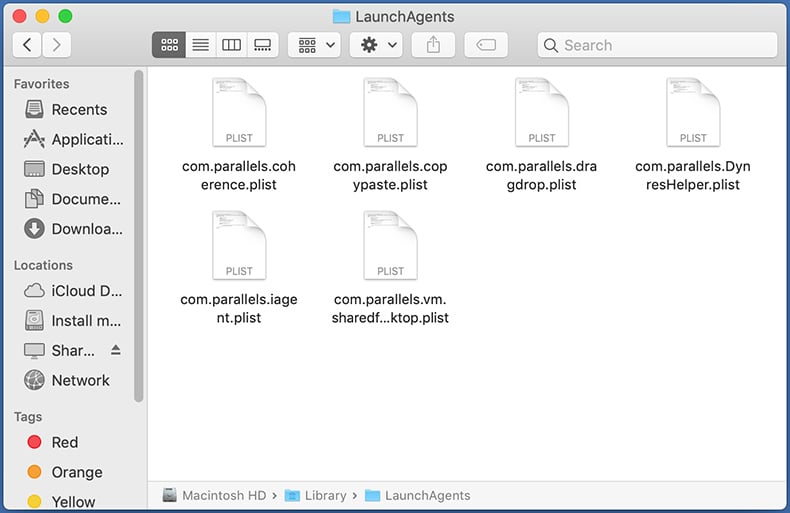
In the "LaunchAgents" folder, look for any recently-added suspicious files and move them to the Trash. Examples of files generated by adware - "installmac.AppRemoval.plist", "myppes.download.plist", "mykotlerino.ltvbit.plist", "kuklorest.update.plist", etc. Adware commonly installs several files with the exact same string.
 Check for adware generated files in the ~/Library/Application Support/ folder:
Check for adware generated files in the ~/Library/Application Support/ folder:
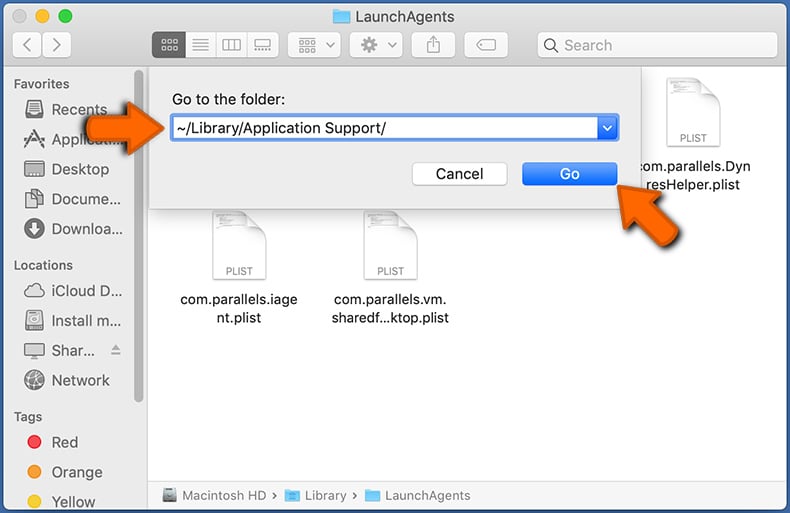
In the Go to Folder... bar, type: ~/Library/Application Support/
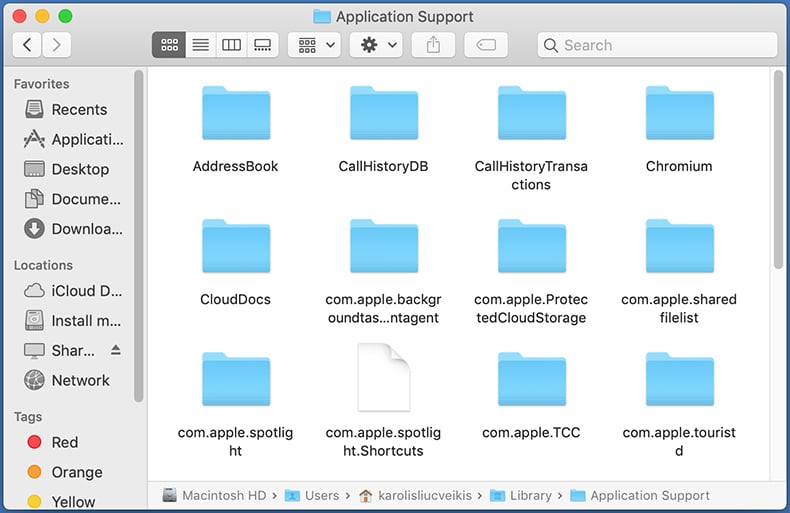
In the "Application Support" folder, look for any recently-added suspicious folders. For example, "MplayerX" or "NicePlayer", and move these folders to the Trash.
 Check for adware generated files in the ~/Library/LaunchAgents/ folder:
Check for adware generated files in the ~/Library/LaunchAgents/ folder:
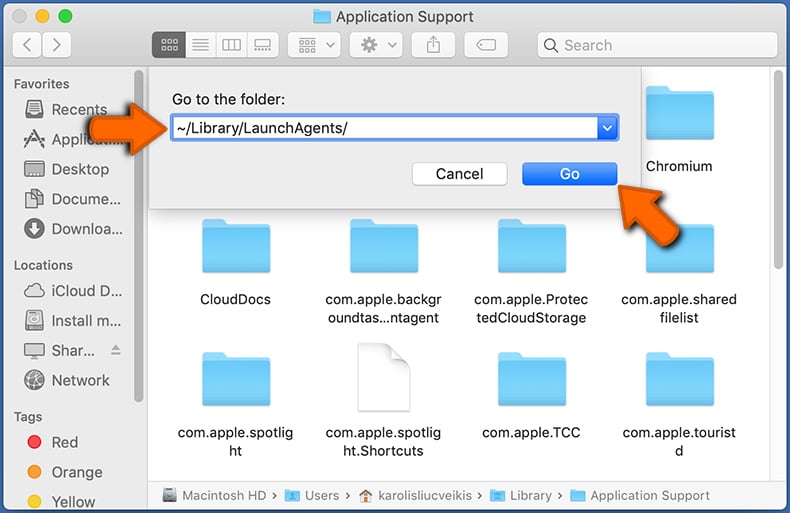
In the Go to Folder... bar, type: ~/Library/LaunchAgents/
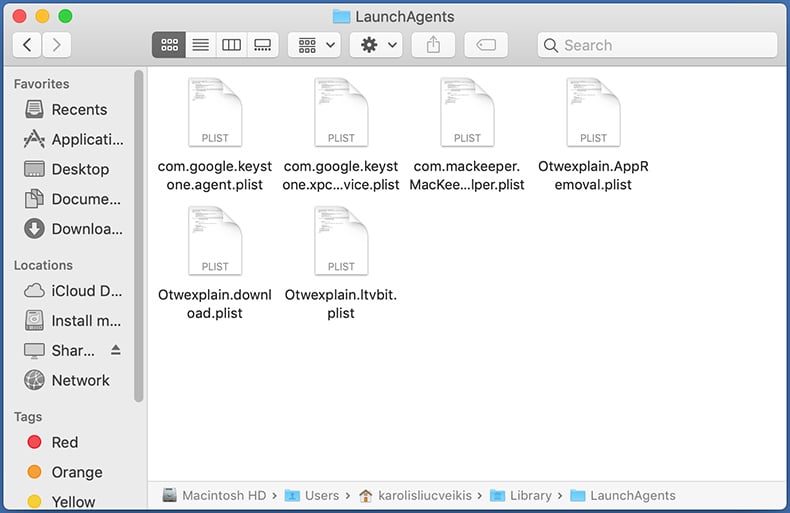
In the "LaunchAgents" folder, look for any recently-added suspicious files and move them to the Trash. Examples of files generated by adware - "installmac.AppRemoval.plist", "myppes.download.plist", "mykotlerino.ltvbit.plist", "kuklorest.update.plist", etc. Adware commonly installs several files with the exact same string.
 Check for adware generated files in the /Library/LaunchDaemons/ folder:
Check for adware generated files in the /Library/LaunchDaemons/ folder:
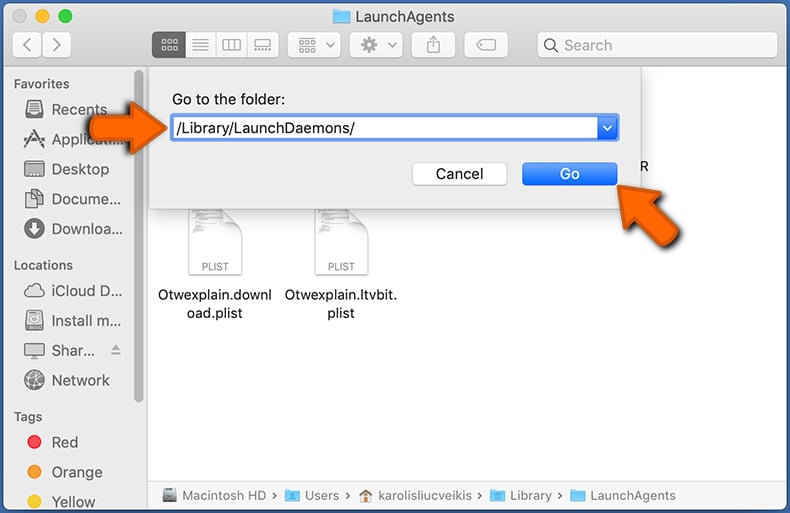
In the "Go to Folder..." bar, type: /Library/LaunchDaemons/
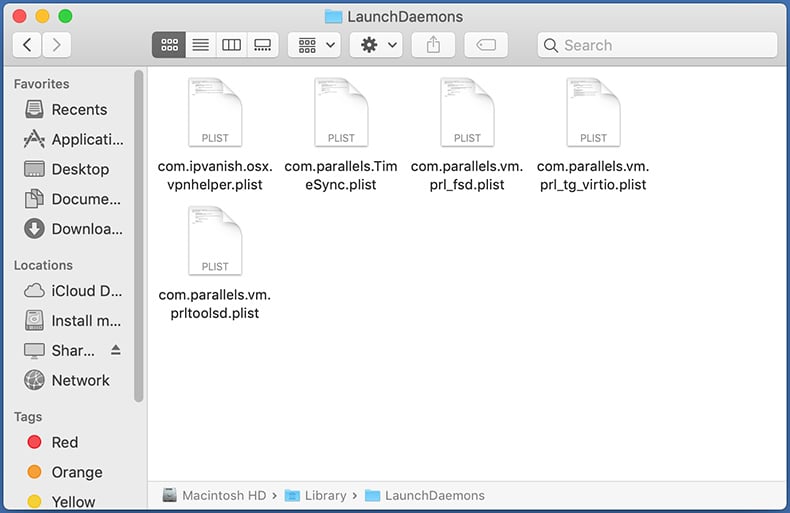
In the "LaunchDaemons" folder, look for recently-added suspicious files. For example "com.aoudad.net-preferences.plist", "com.myppes.net-preferences.plist", "com.kuklorest.net-preferences.plist", "com.avickUpd.plist", etc., and move them to the Trash.
 Scan your Mac with Combo Cleaner:
Scan your Mac with Combo Cleaner:
If you have followed all the steps correctly, your Mac should be clean of infections. To ensure your system is not infected, run a scan with Combo Cleaner Antivirus. Download it HERE. After downloading the file, double click combocleaner.dmg installer. In the opened window, drag and drop the Combo Cleaner icon on top of the Applications icon. Now open your launchpad and click on the Combo Cleaner icon. Wait until Combo Cleaner updates its virus definition database and click the "Start Combo Scan" button.
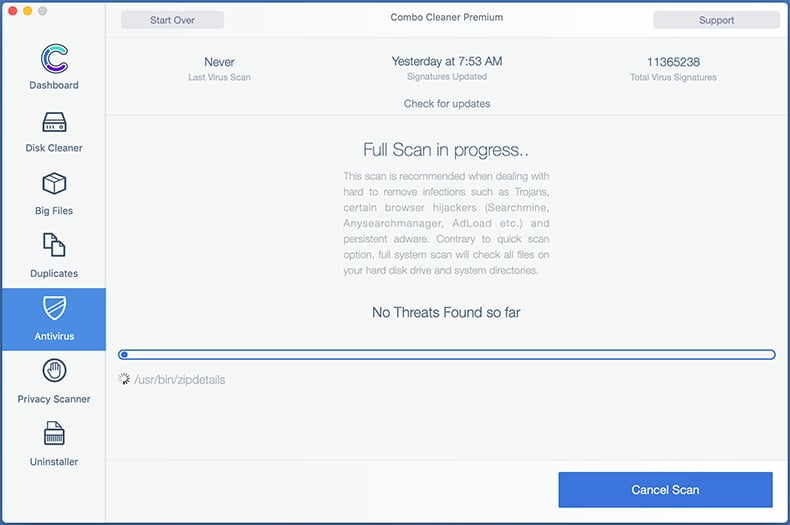
Combo Cleaner will scan your Mac for malware infections. If the antivirus scan displays "no threats found" - this means that you can continue with the removal guide; otherwise, it's recommended to remove any found infections before continuing.
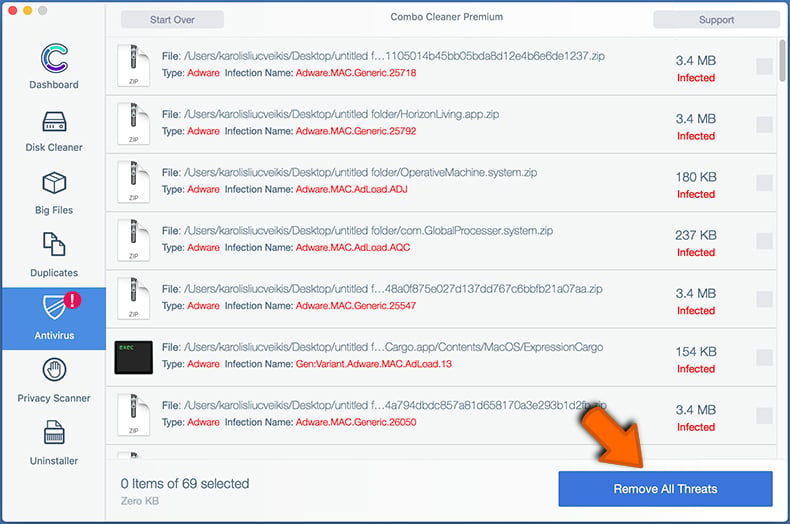
After removing files and folders generated by the adware, continue to remove rogue extensions from your Internet browsers.
Remove malicious extensions from Internet browsers
 Remove malicious Safari extensions:
Remove malicious Safari extensions:
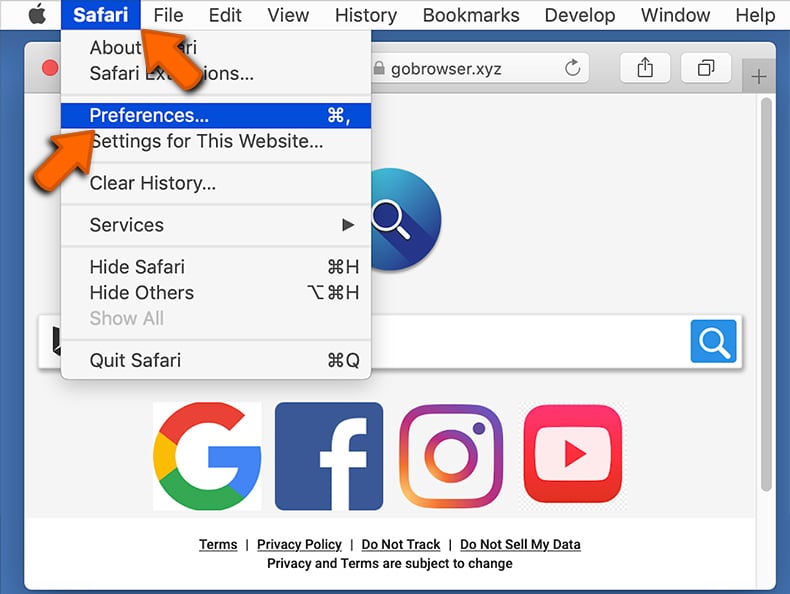
Open the Safari browser, from the menu bar, select "Safari" and click "Preferences...".
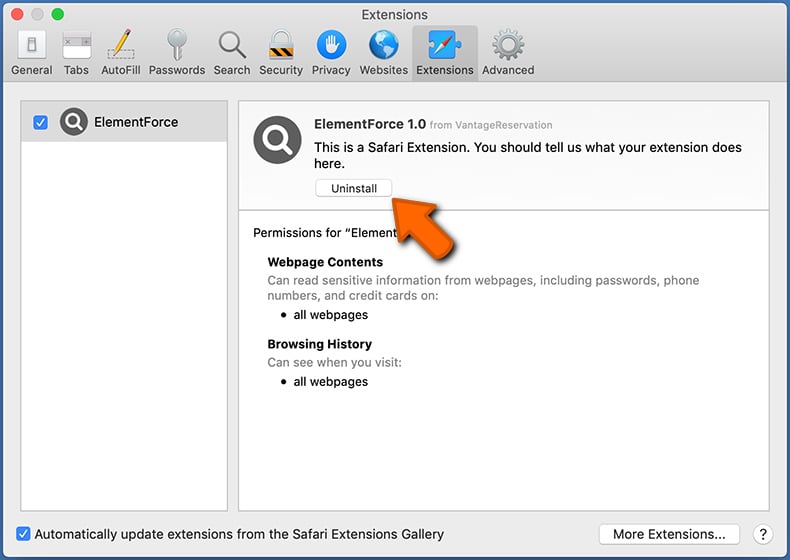
In the preferences window, select "Extensions" and look for any recently-installed suspicious extensions. When located, click the "Uninstall" button next to it/them. Note that you can safely uninstall all extensions from your Safari browser - none are crucial for regular browser operation.
- If you continue to have problems with browser redirects and unwanted advertisements - Reset Safari.
 Remove malicious extensions from Google Chrome:
Remove malicious extensions from Google Chrome:
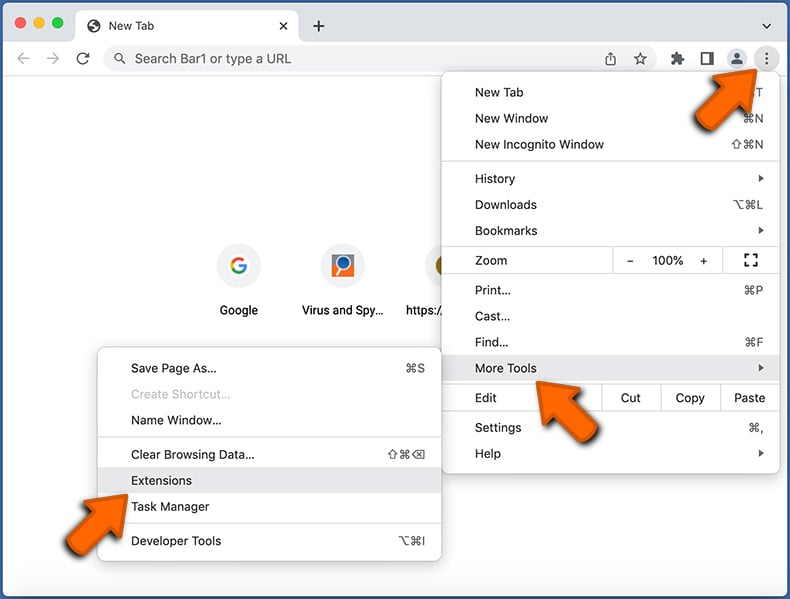
Click the Chrome menu icon ![]() (at the top right corner of Google Chrome), select "More Tools" and click "Extensions". Locate all recently-installed suspicious extensions, select these entries and click "Remove".
(at the top right corner of Google Chrome), select "More Tools" and click "Extensions". Locate all recently-installed suspicious extensions, select these entries and click "Remove".
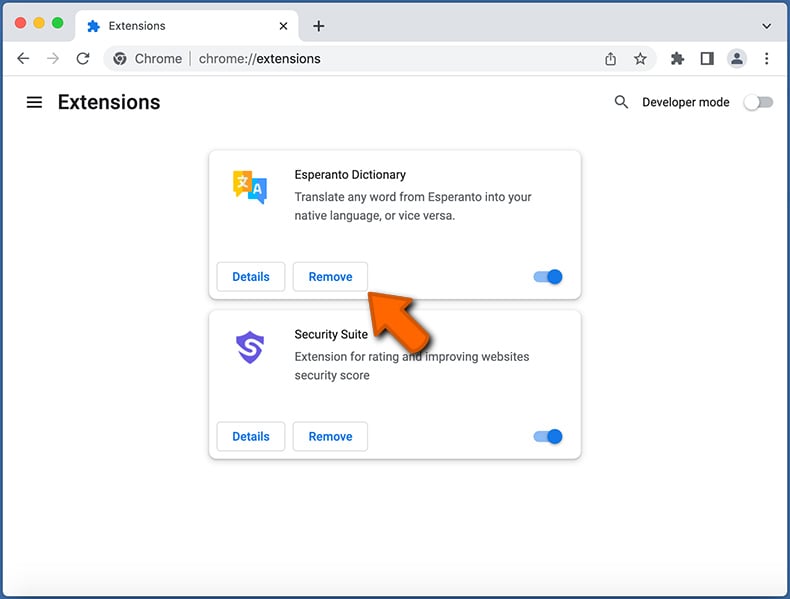
- If you continue to have problems with browser redirects and unwanted advertisements - Reset Google Chrome.
 Remove malicious extensions from Mozilla Firefox:
Remove malicious extensions from Mozilla Firefox:
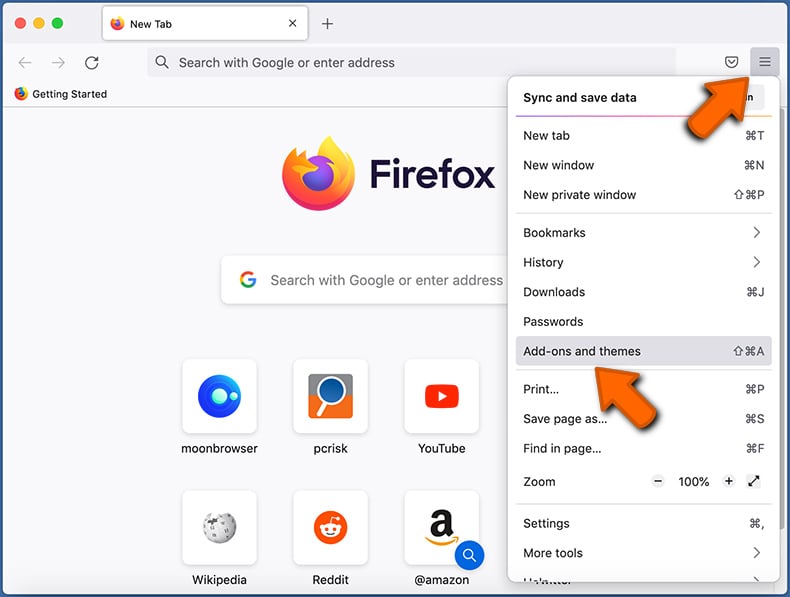
Click the Firefox menu ![]() (at the top right corner of the main window) and select "Add-ons and themes". Click "Extensions", in the opened window locate all recently-installed suspicious extensions, click on the three dots and then click "Remove".
(at the top right corner of the main window) and select "Add-ons and themes". Click "Extensions", in the opened window locate all recently-installed suspicious extensions, click on the three dots and then click "Remove".
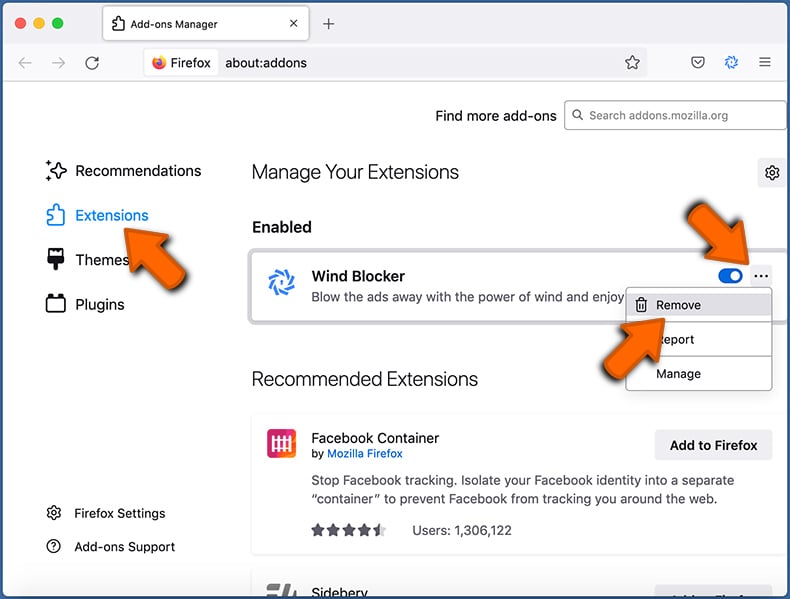
- If you continue to have problems with browser redirects and unwanted advertisements - Reset Mozilla Firefox.
Frequently Asked Questions (FAQ)
What harm can adware cause?
Adware can harm users by causing a compromised browsing experience, inundating them with intrusive advertisements, and potentially leading to a decline in the system's performance. Additionally, adware often collects unauthorized data, posing privacy risks to users by gathering sensitive information without their consent.
What does adware do?
The primary purpose of adware is to display various advertisements (e.g., pop-ups and banners). Additionally, adware can function as a browser hijacker.
How do adware developers generate revenue?
Adware developers commonly generate revenue by promoting various products, websites, or services, and a significant portion of their income is derived from participation in affiliate programs.
Will Combo Cleaner remove DebugCompile adware?
Combo Cleaner will conduct a thorough scan of your computer, targeting and removing all installed adware-type programs. Manual removal may not be foolproof, as some file remnants could persist and remain hidden in the system. Thus, automatic adware elimination is advisable for a complete removal.

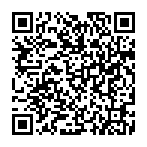
▼ Show Discussion